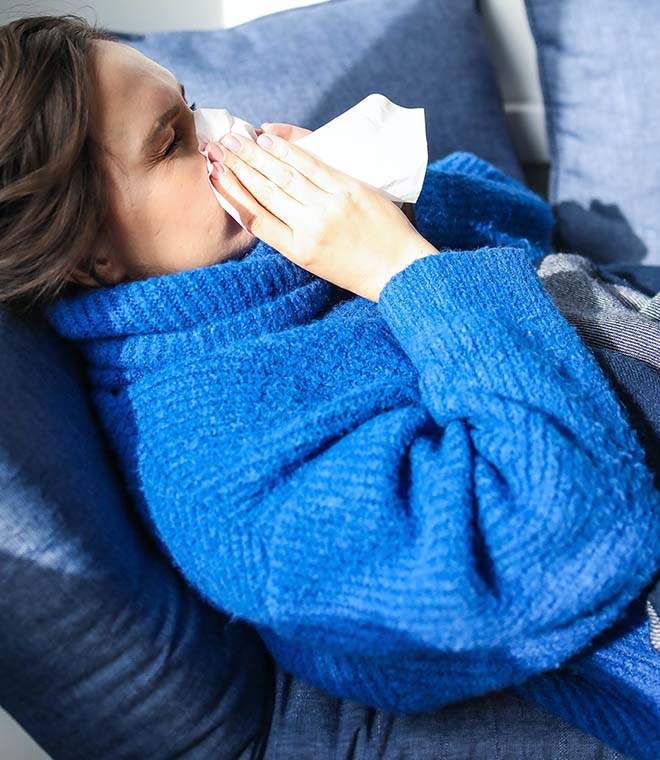Health
Do you have allergies or a cold?
By Sanjay “Jay” Patel, DO | Allergy & Immunology Nov 26, 2024 • 7 min
Although they have some symptoms in common, allergies and colds have different causes, and the best options to manage them differ.
Allergies vs. the cold: what’s the cause?
The causes of allergies and the common cold vary in significant ways. The common cold is an illness brought on by exposure to a virus, most commonly the rhinovirus. Symptoms occur due to your body’s immune response to the infection.
Allergy symptoms are also caused by an immune response, but allergies aren’t caused by an infection. Allergies occur when the body mistakes a harmless protein called an allergen for a threat and launches an immune response to fight it off. People with allergies can develop symptoms in response to many triggers, including:
- Cockroaches
- Dust mites
- Molds
- Pet dander, urine and saliva
- Pollen from grasses, trees and weeds
Because they’re caused by a virus, colds are contagious. You can spread the illness to others. You can also catch a cold by breathing in droplets containing the virus, or by touching contaminated objects. Allergies, however, are not contagious.
What are the differences between allergy and cold virus symptoms?
Sneezing, a runny nose and nasal congestion are common symptoms of both colds and allergies, but other symptoms vary. Some things to be aware of include:
- Itchy, watery eyes: Allergies frequently cause eye irritation, but colds don’t. If a cold or virus does happen to affect the eye, it may be red and irritated as opposed to itchy, as with an eye allergy.
- Sore throat: Colds often cause a sore throat. While post-nasal drip and inflammation associated with allergies can also cause a sore throat, it’s much less common.
- Coughing: Coughing is more likely to occur with a cold than with allergies. However, it is possible to develop a cough with allergies due to throat irritation and post-nasal drip. Both allergies and colds may also cause sneezing.
- Fever: A fever can occur due to a cold, fevers don’t occur due to an allergic reaction.
- Mucus color: With allergies, mucus tends to be thin and clear. If you have a cold, your mucus may be thick and yellow or green, but this isn’t always the case.
How and when symptoms occur can also provide clues about whether you have a cold or allergies. Cold symptoms usually resolve within a week to 10 days, but allergy symptoms may persist for much longer. You may have seasonal allergies if you develop similar symptoms around the same time every year. Allergy symptoms may also have an observable trigger. For example, you might develop symptoms after keeping the windows open in your home or after visiting a friend who has a pet.
Treating allergies vs. the common cold
Because they have different causes, colds and allergies require different treatments. There’s no cure for the common cold, so treatment typically focuses on helping alleviate symptoms until your body fights off the infection. In addition to resting and taking plenty of fluids, you may be advised by your healthcare provider to try over-the-counter cold medicine, such as:
- Pain relievers: Acetaminophen and non-steroidal anti-inflammatory drugs (NSAIDs), like ibuprofen and naproxen, can reduce fever and pain associated with colds.
- Decongestants: Pseudoephedrine alleviates nasal congestion that commonly occurs with a cold.
- Antihistamines: Diphenhydramine and other antihistamines may reduce sneezing and a runny nose.
- Cough suppressants: Dextromethorphan and other cough medicines temporarily ease your coughing reflex.
- Nasal medications: Nasal sprays, such as Flonase, can help relieve stuffy nose, runny nose and postnasal drip from a cold.
- Expectorants: Guaifenesin thins mucus to reduce congestion and other cold symptoms.
- Multi-symptom medications: Some cold medications combine multiple active ingredients, such as a pain reliever and a decongestant, to address more than one cold symptom.
If your child has a cold, check with your healthcare provider for appropriate children’s versions of medications. Read the package carefully and follow all directions.
With allergies, you may need to follow a treatment plan year-round or during certain times of the year, such as grass or tree pollen season. Treatments and remedies for allergy symptoms include:
- Allergen avoidance: Your healthcare provider may recommend changing your routine or modifying your home to reduce your exposure to allergens. For example, you may benefit from using an air cleaner to ease indoor allergies or wearing a mask outdoors during the pollen season. Allergy specialists may perform allergy skin testing to pinpoint your allergy.
- Oral medications: To control allergy symptoms, the over-the-counter antihistamine medications cetirizine, levocetirizine, fexofenadine and loratadine may be taken. Prescription oral allergy medications are also available.
- Nasal sprays: Antihistamines are also available as over-the-counter nasal sprays. Alternatively, your healthcare provider may recommend an over-the-counter corticosteroid nasal spray to alleviate inflammation associated with allergies.
- Immunotherapy: Administered via injection or sublingually, immunotherapy involves exposing the body to small amounts of allergens to desensitize the immune system and reduce allergy symptoms over time.
Determining whether you have a cold or allergies may be challenging on your own, but your healthcare provider can differentiate between the two by discussing your symptoms with you and conducting an examination. If you have a cold, your healthcare provider can recommend over-the-counter medications to help you rest comfortably while recovering. For allergies, they can order tests to identify what you’re allergic to and develop a treatment plan that will allow you to manage symptoms over the long term.
Updated November 2024.
Sources:
- https://www.mayoclinic.org/diseases-conditions/common-cold/expert-answers/common-cold/faq-20057857
- https://www.mayoclinichealthsystem.org/hometown-health/speaking-of-health/is-it-an-allergy-or-the-common-cold
- https://www.mayoclinic.org/diseases-conditions/common-cold/in-depth/cold-remedies/art-20046403
- https://www.mountsinai.org/care/allergy-immunology/allergies-colds
- https://my.clevelandclinic.org/health/diseases/8610-allergies
- https://my.clevelandclinic.org/health/diseases/12342-common-cold
- https://aafa.org/allergies/allergy-treatments/
- https://acaai.org/allergies/symptoms/fever/
- https://www.cdc.gov/common-cold/treatment/index.html
- https://www.mayoclinic.org/diseases-conditions/hay-fever/in-depth/seasonal-allergies/art-20048343



